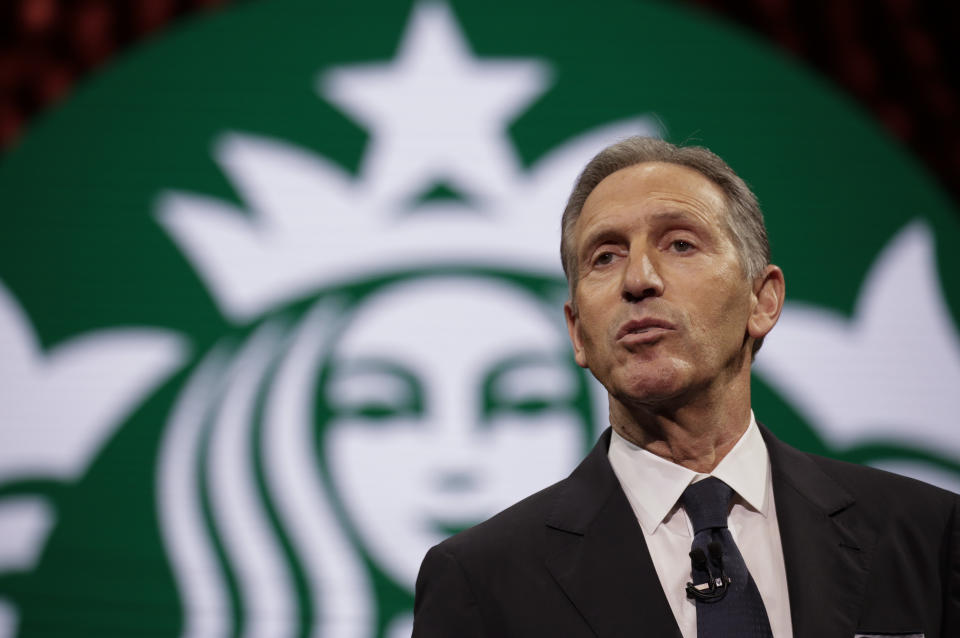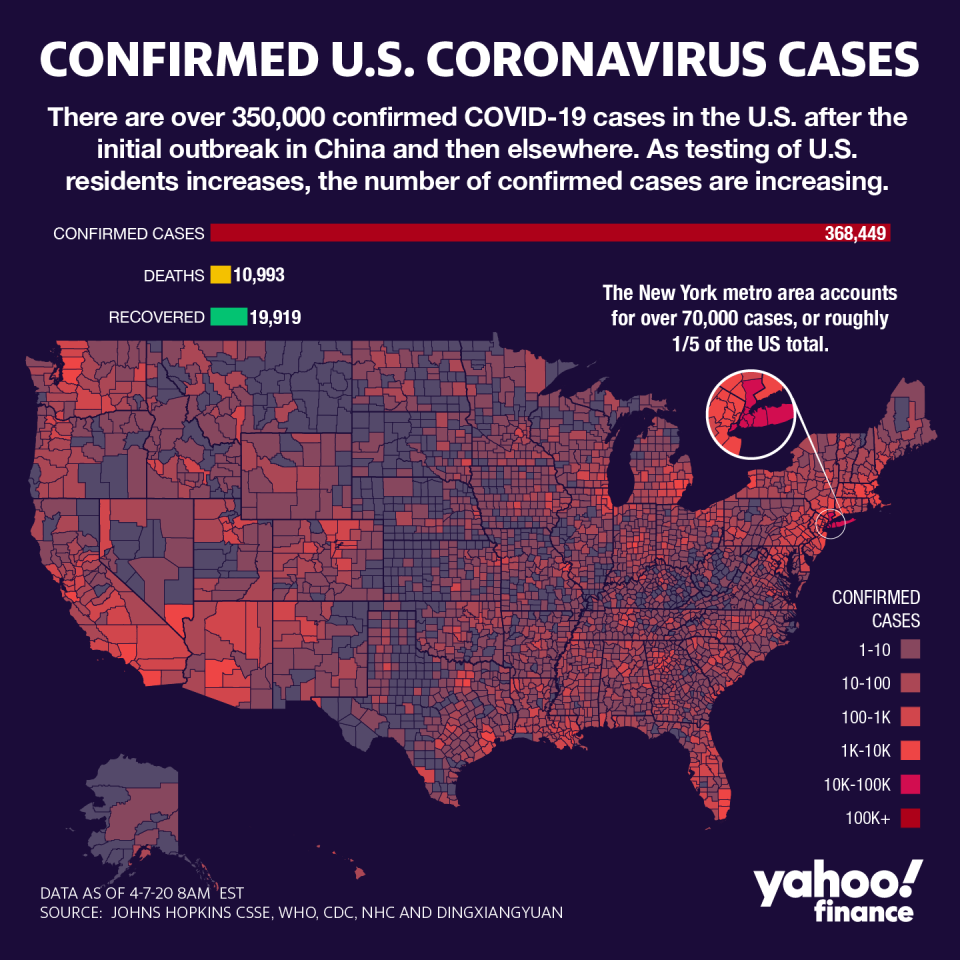Howard Schultz is sending coronavirus stimulus to Seattle workers ahead of federal response
Howard Schultz, the former CEO of Starbucks (SBUX), is helping get much-needed cash into the hands of restaurant workers who've lost their jobs in his hometown of Seattle and King County, Washington, and he's doing it fast.
"Government assistance, unfortunately, is going to be weeks away, and we recognize that this is a group of people that really needs our help,” Schultz told Yahoo Finance. “They are in dire, dire need — facing home insecurity, food instability. And, so, we designed a very innovative program to crack the code on getting cash in people's hands."
Director of the U.S. National Economic Council Larry Kudlow told reporters on Monday that federal stimulus checks of up to $1,200 (plus additional $500 per child) would be sent “this week, perhaps early next,” though when exactly taxpayers will receive their checks depends on what banking information the Internal Revenue Service has on file for them and other factors.
On Monday, the Schultz Family Foundation launched The Plate Fund, delivering one-time cash payments of $500 to impacted restaurant staff within 48-hours. On the first day, The Plate Fund received 1,700 applications with $850,000 in cash payments already on the way to needy workers.
Undocumented workers not eligible for federal stimulus will receive grants
The Seattle area, one of the hardest-hit regions of the COVID-19 crisis in the U.S., has seen its nearly 5,000 restaurants close, meaning around 100,000 workers haven't had a paycheck in three weeks, he said. Schultz added that undocumented workers — who are not eligible for a federal stimulus check— would also be available for the $500 emergency relief grants.
"[Clearly] this is a global catastrophic event, absolutely, in which no business, no organization, no person is going to be immune, no one is safe. But there also is going to be on a parallel basis an extraordinary amount of economic carnage in small businesses, and restaurants specific, they are going to suffer dramatically."

In a matter of two weeks, 10 million people filed for unemployment insurance in the U.S. as the labor market deteriorates because of the COVID-19 pandemic. Many expect the initial claims number to be higher due to a backlog of applications.
"I spoke to the mayor and the governor in the last couple of days, and I was told something that, I guess I'm not surprised by, that is, the system for unemployment has crashed in the state of Washington. And that's not going to be an anomaly around the country," he added.
Schultz acknowledged that the government is trying to do all they can. Still, it also has to be a "combined effort of shared humanity of business, of nonprofits, and the government coming together —without any blame and [with] shared humanity — to do everything we can to kind of walk in the shoes of people, who unfortunately at this point in time, to no fault of their own, these are hard-working people, who are facing such a desperate situation."
‘The issue is survival’
In the wake of the passage of the historic $2 trillion emergency stimulus package, The CARES Act, the challenge is the time it takes to get the checks in the hands of people.
"We have spoken to many restaurant owners in Seattle as well as restaurant workers and the common theme, unfortunately, was that the bureaucracy, the red tape in the way the system has been just overloaded with demand. People are very frustrated and concerned that this isn't happening fast enough. And there's a lot of bottlenecks," Schultz said.

He also pointed out that it's becoming increasingly clear that $2 trillion "is not going to be nearly enough to satisfy the economic issues." Schultz estimated that it could exceed $5 trillion, and Congress needs to move quickly.
"In the same context that we are trying to flatten the coronavirus curve, we have to flatten the economic curve of despair," Schultz said, pointing out that "very well over 30% of small business owners and restaurants" might not be able to reopen their stores.
"I think small businesses are going to be facing the most significant challenges of their business life today and in the coming weeks and months, of just whether or not they can survive. And most businesses that are small, and restaurants, specifically, run their business month to month, and rely on the support of their bank, the support of their landlord in support of their vendors."
He hopes that Congress finds a way to "create a backstop," so the landlords and mortgage holders can access a facility that's government-backed that will prevent putting people out of business. He later highlighted the interconnected nature of business and why this is so critical.

"If you're a landlord, and you're demanding the rent of your restaurant or small business a month or two out, and that person can't pay the rent, and they end up leaving your space, your environment is going to be empty,” he said. “It's not going to be filled for a long, long time. So, there is a shared interest that we all have in seeing, ‘how can we work together to ensure survival?’”
“The issue, I hate to say it, the issue is survival,” he added. “It's, 'how do we survive in this environment?' And that's what every small business is going through. And, the workers cannot survive with weeks going by between now and government assistance without some cash infusion. And that's why we created The Plate Fund."
According to Schultz, Congress must act now in rolling out "a comprehensive plan" that "would go so far in satisfying the epidemic of fear, uncertainty, and panic that is now going through the country as well as the coronavirus."
While The Plate Fund will focus on the Seattle area, Schultz said they would open-source the program for other cities to model. They also partnered with an organization called UpTogether, a cash transfer digital platform making this possible.
"I'm confident that given the groundswell of interest in support, not only from people and foundations that can write big checks, but we're already getting small donations. And, it's been so emotionally satisfying to see that. Since we've launched at seven o'clock this morning, I've already gotten calls from other cities and leading restaurateurs saying, 'Is this a model that you can help us with other cities?'" Schultz said.
"This is day one,” he added.
Schultz estimates That Plate Fund will need to raise $30 million, noting "the need is certainly greater than the amount of money we've raised to date, and we have to raise a lot more money, a lot more awareness," he said.
-
Julia La Roche is a Correspondent at Yahoo Finance. Follow her on Twitter.
Mark Cuban: Trump is right on infrastructure, but we can't do this the old school way
Cuban won't say if he'll run for president, but notes the door is 'wide open'
Follow Yahoo Finance on Twitter, Facebook, Instagram, Flipboard, LinkedIn, and reddit.
Read the latest financial and business news from Yahoo Finance


